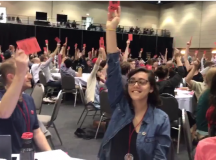The authors (Cary Nelson, Susana Cavallo, David Greenberg, Rebecca Lesses, Jeffry Mallow, and Stan Nadel) on behalf of the Executive Committee of the Alliance for Academic Freedom, offer a concise and accessible summary of the arguments against both boycott and divestment.
The antizionist encampments that swept universities throughout the west from April to May 2024 made the call to ‘DIVEST!’ from companies doing business in Israel a universal demand. Resolutions on campuses and in local communities often included a demand to boycott Israeli universities and other institutions as well.
Though the encampments were either dismantled or abandoned, new resolutions to boycott or divest continue to proliferate. Some combine divestment and academic boycotts into one resolution. Debates over those resolutions consistently devolve into debates about Israeli government practices and policies. In the process, people often lose sight of the more universal issues at stake in these demands. But people fighting such resolutions need a statement addressing the problems inherent in all such demands. We believe it would be useful to summarise those issues in a clear and accessible form. This two-part piece is the result. It covers the problems with boycott and divestment demands in two separate bullet-point statements:
What is Wrong with Academic Boycotts?
– Academic boycotts limit the freedom students should have to make their own decisions about how to design their educational programme. If a university closes a study abroad programme, students lose an educational option. The freedom to choose where to study abroad should not be eliminated on behalf of those who disapprove of the foreign country at issue.
– Academic freedom includes the right faculty members have to define their own research agendas and pursue research collaborations with colleagues in other countries. Academic freedom requires that research ideas and research results alike can be shared across international borders. Group research collaboration often includes institutional cooperation in setting up labs or institutes shared between countries. An academic boycott makes that impossible. It curtails one of academic freedom’s most basic principles.
– Some people like to claim that academic boycotts only affect institutions, not individuals, but even just the first two bullet points above prove that is not true. Universities are not just empty buildings. It is the people who work at a campus that bring the institution to life and benefit or suffer from the consequences of institutional policies.
– Advances in knowledge in all fields benefit from unfettered international cooperation across borders. Some discoveries or inventions that could save lives may never come to pass or be long delayed if opportunities for international collaboration are blocked.
– Experience has shown that organised academic boycotts encourage destructive ad hoc boycott actions by individual faculty members – like refusing to write a recommendation for a student who wants to study at a boycotted university or automatically rejecting an essay from a faculty member in another country.
– Students and faculty members from a boycotted university find, for example, that they are automatically turned down when they apply to speak at a conference or apply for a job in a country where institutions have organised a boycott . Individual students and faculty are thereby unfairly made to pay personally for the policies of their government.
– Academic boycott organisers often demand that universities in the country at stake issue official statements opposing their government’s policies, but universities in democratic societies are expected to be neutral about many political issues. That reinforces the freedom individual students, staff, and faculty must have to express their own views free of institutional coercion. In areas where universities have the freedom to issue political opinions, neutrality may often be the best option.
– College and university faculty members in democratic societies often disagree publicly with their government’s policies and practices. Academic boycotts curtail intellectual exchanges with the very people in a country one can learn most from, indeed the people who might contribute most to international collaboration aimed at changing government policies.
– Relationships with students or faculty abroad do not imply mutual approval of the policies and practices of the respective national governments.
– Academic boycotts can mean discriminating on the basis of religion, race, or national origin. In some countries an academic boycott would therefore violate the law. Covering up that fact by claiming that those factors had nothing to do with why the boycott was initiated does not change the reality.
– Academic freedom includes the right individuals have to approve or disapprove of boycott actions and make their own choices about whether to cooperate with students and faculty elsewhere. Organised group boycotts impose consequences on all and take away that right.
– The opposition to academic boycotts has operated as a universal principle. It applies whether or not one approves of a given government. Overturning it for one country will inevitably produce a series of comparable initiatives for other nations, especially undemocratic states that do not grant basic freedoms to any of their citizens. Such debates may be won or lost according to how much power the pro-boycott constituency wields. The principle itself will not survive multiple assaults.
What is Wrong with Divestment Resolutions?
– People promote campus divestment demands and resolutions under the illusion that these are potent weapons to be used against a country whose policies they reject. In reality, if a university sells its stock in a company, someone else will buy it. There are always less socially or politically motivated investors prepared to act. The net effect economically is nil. And divestment has no inherent impact on environmental or societal damages.
– It would take a major coordinated campaign to depress the stock price for a given corporation. A campus campaign will not have that effect.
– It might be appealing to divest from companies headquartered in a target country, but such opportunities are often very few, less so with multinationals. Resorting to firms ‘doing business’ in a country implicates complex financial networks that are impossible to disentangle.
– The global market means that companies increasingly sell products internationally. A product used in an objectionable way in one country may have benign uses in another. Divestment, in effect, condemns both uses. Caterpillar’s tractors can plant fields of corn or demolish buildings. They can be resold and thus directed to either purpose. There is no way to police the downstream uses.
– Many companies have diverse product lines. Your stock is an investment in the company as a whole. There are ways to protest some products only, but divestment is not one of them. Boeing manufactures both airplanes and weapons. A political objection to weapons makes little sense applied to airplanes.
– Weapons systems can have both offensive and defensive uses. While an objection to offensive uses by one country may make sense, a protest against defensives uses by other states may make little sense. Divestment irrationally covers both cases.
– A protest against a company amounts to a protest against the workers employed in manufacturing its products. They may work in your own city, state, province, or country. Supporters of divestment may want to look into the employment impact an aggressive campaign could have.
– Once you divest, you lose your influence over company policies. Stockholder activism can influence those policies. It is an alternative to divestment.
– Institutions seek to maximise the returns on their endowments because the income helps strengthen their independence and their ability to weather other challenges. Giving students and faculty members influence over investment decisions is not the most reliable way to guarantee maximum returns.
– Institutions have a responsibility toward donors to maximise the return on endowed funds to support student scholarships, endowed professorships, and other beneficial programmes.
– Colleges that invest in pooled funds may not have the requisite staff or expertise to design their own investment portfolios. It is generally not practical to pull selected stocks out of a pooled fund.
– Calls for investment disclosure and transparency run into problems with alternative investments like hedge funds that may represent a significant fraction of an institution’s portfolio.
– The passionate divestment campaigns on campus involve a certain amount of magical thinking about their potential impact.
– Divesting from investments in another country sends a psychologically and politically alienating message to those who identify with that country or hold citizenship there. That includes those visiting or studying from abroad.
– Divestment can imply discrimination on the basis of national origin.



































